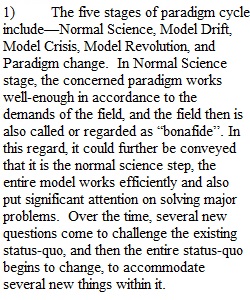


Q Respond to each of the following questions with a short (200-250 words) essay. The questions are based on information contained in the “Reflections” context essay and the “Introduction” essay by Ian Hawking. • The Paradigm Cycle occurs in five stages. List these stages and describe what is occurring in each of them. • What was the effect of Kuhn’s Paradigm Concept on the Philosophy of Science? • How does Kuhn distinguish between “Normal Science” and the “Extraordinary Science” that leads to a paradigm shift? • On page xvi of his “Introduction”, Hawking paraphrases Kuhn with the statement “Research problems do not aim to produce real novelty.” Do you agree with this statement? Explain your answer. • How does Kuhn define progress in scientific knowledge? Do you agree with him? Explain your answer. Rubric LSIS 5133 Standardized Essay Rubric (100 pts) LSIS 5133 Standardized Essay Rubric (100 pts) Criteria Ratings Pts This criterion is linked to a Learning OutcomeAdherence to prompt 20 to >12.0 pts Full Marks Student followed the prompt and instructions provided for the essay including length requirement. 12 to >0.0 pts Partial Marks Student partially followed the prompt and instructions provided for the essay. 0 pts No Marks Student did not follow the prompt and instructions provided for the essay if an essay was submitted at all. 20 pts This criterion is linked to a Learning OutcomeFocus of essay 20 to >12.0 pts Full Marks The student employed a consistent thesis throughout the essay. 12 to >0.0 pts Partial Marks The student employed a thesis in most parts of the essay. 0 pts No Marks The student did not employ a consistent thesis throughout the essay if an essay was submitted at all. 20 pts This criterion is linked to a Learning OutcomeWriting style and quality 10 to >6.0 pts Full Marks The essay had no errors in grammar, mechanics, usage, spelling, or APA style. 6 to >0.0 pts Partial Marks The essay had some errors in grammar, mechanics, usage, spelling, or APA style. 0 pts No Marks The essay had many errors in grammar, mechanics, usage, spelling, or APA style if an essay was submitted at all. 10 pts This criterion is linked to a Learning OutcomeAnalysis & evidence 30 to >18.0 pts Full Marks The student conducted a strong critical analysis of the topic and incorporated evidence from the text that is relevant to the argument. 18 to >0.0 pts Partial Marks The student conducted a sufficient analysis of the topic and incorporated evidence from the text that is only somewhat relevant to the argument. 0 pts No Marks The student conducted a weak critical analysis of the topic and did not incorporate evidence from the text that was relevant to the argument if an essay was submitted at all. 30 pts This criterion is linked to a Learning OutcomeOrganization 20 to >12.0 pts Full Marks The essay is arranged logically and contains all required sections. 12 to >0.0 pts Partial Marks The essay is adequately organized and is missing at most one section. 0 pts No Marks The essay has poor organization and is missing two or more sections. 20 pts Total Points: 100
View Related Questions